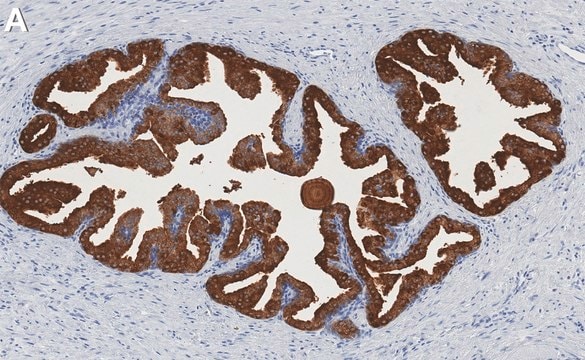추천 제품
형태
solid
SMILES string
Cl.Cc1ncc(CNC(=O)N(CCCl)N=O)c(N)n1
InChI
1S/C9H13ClN6O2.ClH/c1-6-12-4-7(8(11)14-6)5-13-9(17)16(15-18)3-2-10;/h4H,2-3,5H2,1H3,(H,13,17)(H2,11,12,14);1H
InChI key
KPMKNHGAPDCYLP-UHFFFAOYSA-N
애플리케이션
Nimustine hydrochloride is an antineoplastic.
신호어
Danger
유해 및 위험 성명서
예방조치 성명서
Hazard Classifications
Acute Tox. 3 Oral
Storage Class Code
6.1D - Non-combustible acute toxic Cat.3 / toxic hazardous materials or hazardous materials causing chronic effects
WGK
WGK 3
Flash Point (°F)
Not applicable
Flash Point (°C)
Not applicable
개인 보호 장비
Eyeshields, Faceshields, Gloves, type P2 (EN 143) respirator cartridges
시험 성적서(COA)
제품의 로트/배치 번호를 입력하여 시험 성적서(COA)을 검색하십시오. 로트 및 배치 번호는 제품 라벨에 있는 ‘로트’ 또는 ‘배치’라는 용어 뒤에서 찾을 수 있습니다.
Nancy Berte et al.
Molecular cancer therapeutics, 15(11), 2665-2678 (2016-11-04)
Malignant gliomas exhibit a high level of intrinsic and acquired drug resistance and have a dismal prognosis. First- and second-line therapeutics for glioblastomas are alkylating agents, including the chloroethylating nitrosoureas (CNU) lomustine, nimustine, fotemustine, and carmustine. These agents target the
Marina Pajic et al.
Clinical cancer research : an official journal of the American Association for Cancer Research, 23(22), 7020-7033 (2017-08-20)
Purpose: We aimed to characterize and target drug-tolerant BRCA1-deficient tumor cells that cause residual disease and subsequent tumor relapse.Experimental Design: We studied responses to various mono- and bifunctional alkylating agents in a genetically engineered mouse model for BRCA1/p53-mutant breast cancer.
A Shiraishi et al.
Carcinogenesis, 21(10), 1879-1883 (2000-10-07)
O(6)-methylguanine-DNA methyltransferase plays vital roles in preventing induction of mutations and cancer as well as cell death related to alkylating agents. Mice defective in the MGMT: gene, encoding the methyltransferase, were used to evaluate cell death-inducing and tumorigenic activities of
Bastiaan Evers et al.
Clinical cancer research : an official journal of the American Association for Cancer Research, 16(1), 99-108 (2009-12-17)
Hereditary breast cancer is partly explained by germline mutations in BRCA1 and BRCA2. Although patients carry heterozygous mutations, their tumors have typically lost the remaining wild-type allele. Selectively targeting BRCA deficiency may therefore constitute an important therapeutic approach. Clinical trials
Hajime Asada et al.
The Journal of veterinary medical science, 77(6), 677-684 (2015-02-27)
Canine histiocytic sarcoma (HS) is an aggressive tumor type originating from histiocytic cell lineages. This disease is characterized by poor response to chemotherapy and short survival time. Therefore, it is of critical importance to identify and develop effective antitumor drugs
자사의 과학자팀은 생명 과학, 재료 과학, 화학 합성, 크로마토그래피, 분석 및 기타 많은 영역을 포함한 모든 과학 분야에 경험이 있습니다..
고객지원팀으로 연락바랍니다.







